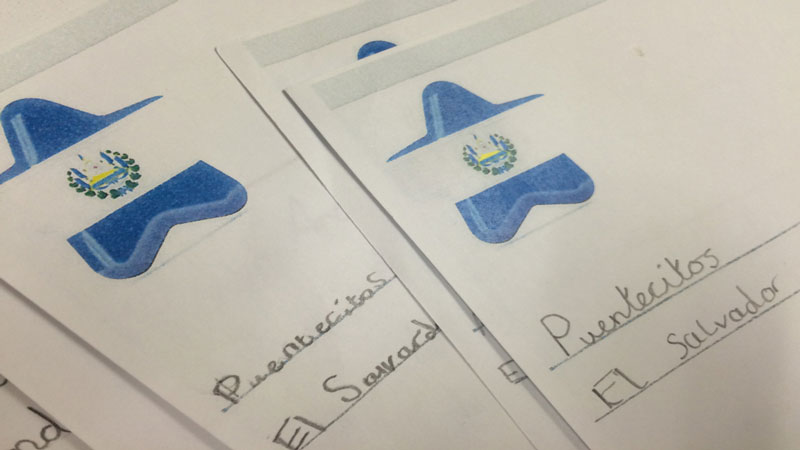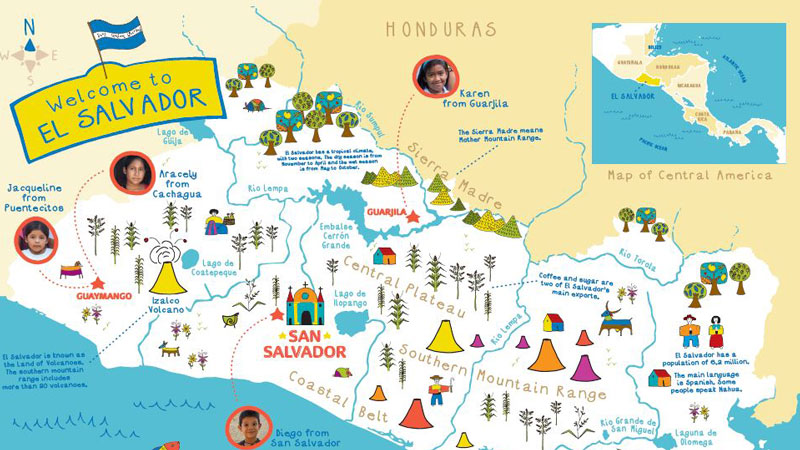Learning about climate in class
Katie Thilthorpe works in the CAFOD Schools Team. She recently received a batch of letters and work from children in XII Apostles Primary School in Lancashire who have been exploring life in El Salvador.

“After I saw your beautiful landscape I wished I could live in El Salvador but the only thing that makes me sad is the water pollution. That’s why we are raising money for your country and right now we have £500. When we raise enough we will send it to CAFOD and they will send it to you. I hope that you will have nice clean water and I hope to see you and the Sierra Madre mountains one day.” Olivia, Year 4.
Since its release in 2015 primary schools across England and Wales have been using CAFOD’s El Salvador geography photo pack, including XII Apostles Primary School in Lancashire. All the children in the school aged 7-11 have been using the resources, and in March the pupils wrote letters to the four children featured in the pack. The school kindly sent some of the letters to us and I was lucky enough to read them.
Order your free copy of the El Salvador Education Pack
The El Salvador pack, which can be ordered or downloaded online, includes a country map, information sheets, photo cards and links to brilliant online films, which bring the stories and themes from the pack to life. Find out how you could use the pack in your school

The pack also contains a range of creative classroom activities suitable for children aged 7-11. It covers a wide range of themes from the National Curriculum such as land use, economic activity and volcanoes-a topic the children from XII Apostles Primary School learnt a lot about. Corey explained in his letter what his class did:
“We learnt about the different vocabulary of volcanoes and made a poster about it. One week later, we created clay volcanoes. After that, we left them to dry and then painted them in realistic colours. I loved inventing the volcanoes and painting them.”
The class then learnt about volcanoes in El Salvador, made a jigsaw of tectonic plates and ‘did Kung Fu moves’ to remember the way a volcano erupts-definitely something we should all try ourselves!
Watch our film about volcanoes in El Salvador:
Other pupils from XII Apostles Primary School wrote about the challenges children in El Salvador face due to climate change. The El Salvador information sheets and online film explains how families and communities in different areas are adapting to a changing climate and what CAFOD is doing to support them.
Join our climate campaign: email Nick Hurd MP today to ask him to support energy services overseas
We work alongside families in El Salvador to find different ways to deal with these changes. We support communities during natural disasters like earthquakes and floods by providing equipment and teach them how to use this equipment so they can help themselves in an emergency.
The El Salvador pack also links well to Catholic Social Teaching and is an excellent resource for RE lessons, especially if you are teaching the Universal Church units from the Come and See RE programme. One of the principles that the children at XII Apostles schools focused on was that of solidarity. Sanchia wrote:
“We realised that you have lots of water pollution and some of you have to live near factories and they are putting chemicals in the river and you have to walk for a while just for water, which is a pain so we will pray for you so that your water will get better.”
Find out how you can use the El Salvador pack in RE lessons this term.
Reading the fantastic letters by the pupils XII Apostles really made me smile. They clearly enjoyed learning about El Salvador and CAFOD’s work in the country. It’s also great to know about the different ways schools are using the Geography pack and I expect it will continue to be a popular, engaging resource for many teachers.
The El Salvador Education Pack for Key Stage Two was awarded a Silver Geography Association Publishers’ Award in 2015. It was produced following the release of a new National Curriculum in 2014.
Reblogged this on CAFOD Liverpool Blog.